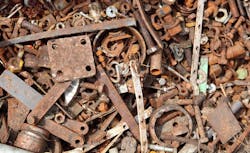Scrap Metal Company Settles Clean Water Act Violation Allegations
The Massachusetts Attorney General’s Office announced a settlement after an investigation of a scrap metal processor company.
Western Mass News reported that according to the attorney general’s report, the scrap metal company, Joseph Freedman, allegedly illegally polluted the Chicopee River and Springfield’s storm drain system.
Joseph Freedman Company Incorporated is the largest privately-owned scrap metal processor in New England, reported Western Mass News.
“This came to my office as a result of receiving some reports and, as we always do, we did an investigation and we actually learned that over years, this company’s own storm water sample showed that for a long, long time, it had been discharging this storm water with illegal levels of pollutants,” said Healey, reported Western Mass News.
The attorney general’s complaint stated that the company allegedly violated the federal Clean Water Act (CWA) by illegally discharging polluted industrial storm water from its facility through the Springfield municipal storm drain system. This discharge ended up in Poor Brook, which is a tributary of the Chicopee River. The attorney general’s complaint also includes that the company did not consistently submit benchmark monitoring to the EPA.
A statement received by Western Mass News from Joseph Freedman Company attorney stated:
“Improving our storm water discharges is an essential part of that commitment, and as the consent decree itself notes, Freedman has already eliminated all storm water discharges flowing down the ramp located on the southern edge of the facility. While we disagree with the assertions made by the attorney general in her complaint, we recognize that, like everyone else in the metals industry that deals with dissolved metals measured in the parts per million, we must continue to do better. We have agreed to make significant improvements to our storm water treatment systems, far beyond that which would be required under the applicable regulations.”
“This is a situation, where a company was allowing the rain, the snow, the storm water to run through their property, to pick up the dangerous heavy metals and to have those run right off and to discharge into the river and that is illegal,” Healey said, reported Western Mass News.
Pollutants including lead, aluminum, iron, copper, and zinc along with other heavy metals that were being discharged into the river showed that levels were significantly higher than what is allowed under the permit, reported Western Mass News.
In March 2019, the water discharged contained 23,684% more cooper than the EPA’s benchmark, also exceeding the EPA benchmarks in September 2020 and in June 2021, reported Western Mass News.
It is important to note that these contaminants are not affecting the drinking water supply, according to the AG’s office, reported Western Mass News, although it can still harm fish.
